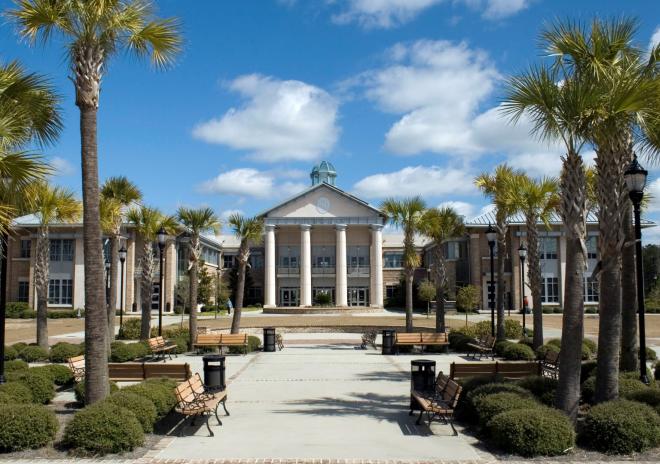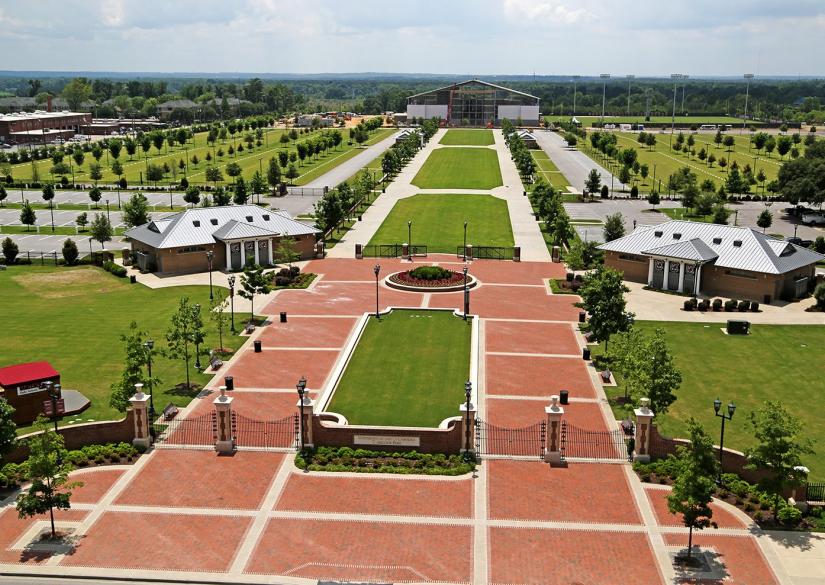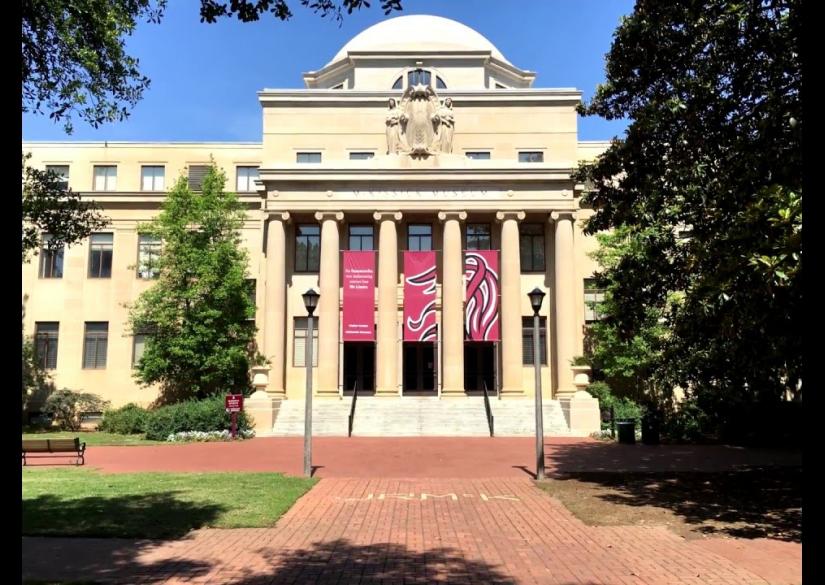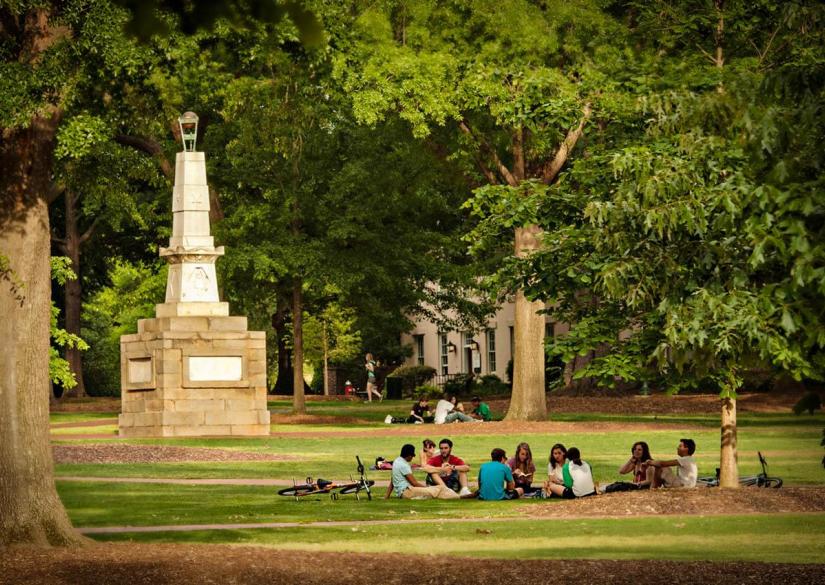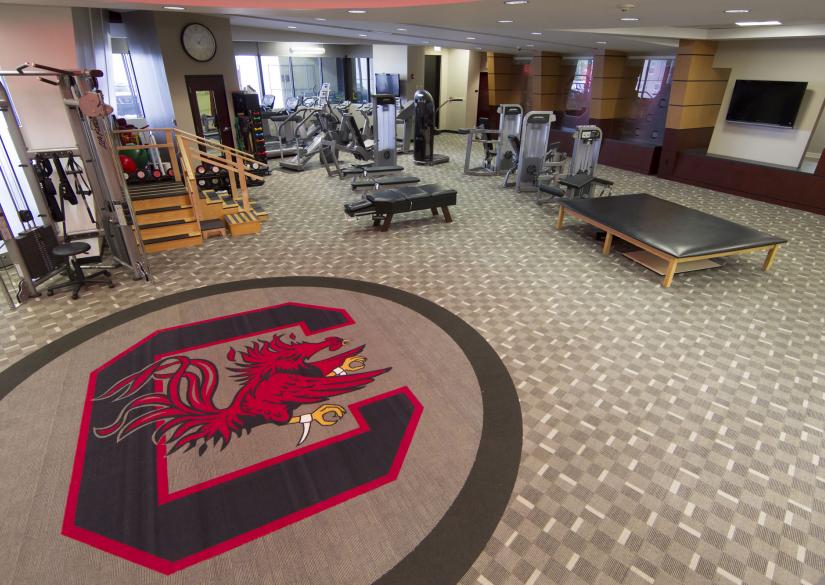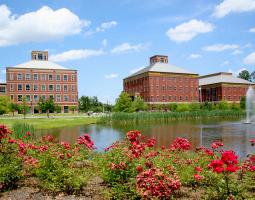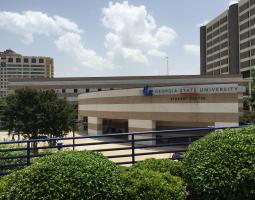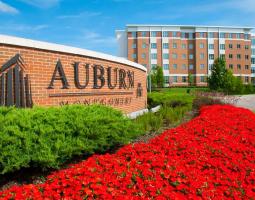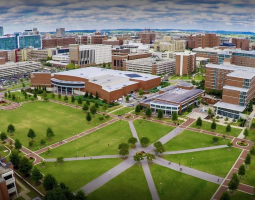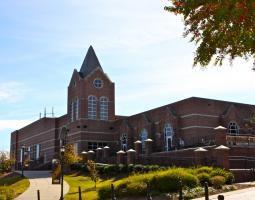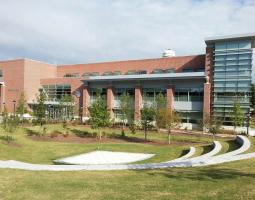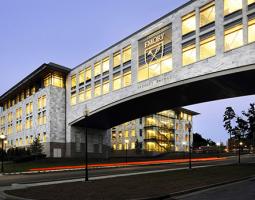University of South Carolina
Programs and prices, tuition fees in University of South Carolina
Quick overview:
- Age of participants: from 17 years;
- Duration of training: 4 years (standard programs);
- Level of English: IELTS 6.5 / TOEFL 77 / Pearson Versant 69;
- Level of education: completed secondary school (certificate of secondary (complete) general education diploma);
- Foreign students are encouraged to apply through the International Year One (Academic Accelerator Program);
- Language of instruction: English.
About the educational program: University of South Carolina offers students from all over the world a quality and demanded education in a variety of ways. For admission, you must have a diploma of graduation and a certain level of English. Foreign students can take advantage of the special course International Year One (Academic Accelerator Program), undergo 2 or 3 semester adaptation and go to the main educational programs without wasting time. Bachelor's programs are divided into 11 major directions:
- Business, finance and economics;
- Education;
- Engineering and Information Technology;
- Hotel and Tourism;
- Law, international relations and politics;
- Liberal arts;
- Music, theater and the arts;
- Nursing, health, care and sociology;
- Pharmacy and pre-med;
- Sciences;
- Sports, fitness and nutrition.
Each student chooses not only the main specialization, but also the additional Major and Minor. Major - the main area of education, characterized by in-depth study of all possible aspects and nuances; it usually contains 10 to 19 courses. Minor is an additional field, the study of which provides a number of advantages: with its help you can add a certain specialization to the main profession, you can expand your career and professional skills and qualities, you can finally choose the direction "for the soul" and engage in an interesting business for yourself . Such a system of education makes the student more erudite and more professionally trained. Each bachelor's program is evaluated in a certain number of credits, students earn credits as they go through the courses. All studied disciplines have a strict scientific plan, give deep theoretical knowledge and the ability to apply them in practice. During the training there are classes of different types:
- Lectures, extended lectures;
- Seminars, interactive seminars;
- Lectures and seminars with invited experts;
- Independent work, work in groups and mini-groups;
- Laboratory work and experiments;
- Out of university studies.
Regularly conducted work to verify the progress and correction of the curriculum: exams, tests, essays, presentations, coursework. University teachers are real masters of their work, and help everyone to open their potential. All students undergo professional internships and practice in various companies and organizations, healthcare institutions and public authorities. Foreign students receive significant support in developing their career and employment skills.
In addition to standard training, accelerated bachelor's and master's programs (Accelerated degree) are available at the university, which are characterized by a balanced and carefully planned plan, a rapid transition between bachelor's and master's programs and reduced study time (3 + 2 or 4 + 1 instead of 4 + 2). The process of enrolling in accelerated programs does not differ from the standard admission to the bachelor's program. Programs for obtaining certificates are also available.
After successful completion of the training, students are given a state-recognized diploma and are awarded a bachelor's degree in the relevant field of science. Graduates of the University of South Carolina are employed in prestigious companies and organizations, government bodies, open their own business, or continue their studies in the magistracy.
Bachelor programs at the University of South Carolina (Majors):
- Accounting;
- Advertising;
- African American Studies;
- Anthropology;
- Art Education;
- History of art;
- Art studio;
- Biochemistry and molecular biology;
- Biological Sciences;
- Biomedical engineering;
- Broadcasting Journalism;
- Business Economics;
- Cardiovascular technology;
- Chemical Engineering;
- Chemistry;
- Chinese Studies;
- Civil and Environmental Engineering;
- Classical studies;
- Comparative literature;
- Computer engineering;
- Computer Information Systems;
- Computer science;
- Criminology and Criminal Justice;
- Dancing;
- Preschool education;
- Economics;
- Electrical Engineering;
- Elementary education;
- Engineering;
- English;
- Environmental Science;
- Environmental studies;
- Educational Science;
- Experimental Psychology;
- Film and media research;
- Finance;
- French;
- Geography;
- Geological sciences;
- Geophysics;
- German;
- Global learning;
- History;
- Hospitality Management;
- Information Science;
- Complex information technologies;
- Interdisciplinary research;
- international Business;
- International training;
- Journalism;
- Control;
- The science of management.
Accelerated Bachelor's Program + Master (Accelerated degree):
- Business Administration;
- Computer Science / Computer Engineering;
- Biomedical Engineering;
- Chemical Engineering;
- Civil Engineering;
- Electrical Engineering;
- Mechanical Engineering;
- Nuclear Engineering;
- Information technology in health;
- Health Promotion, Education and Behavior;
- Nursing;
- Social Work.
Brief information:
- Age of participants: from 20 years;
- Duration of the programs: 1-2 years;
- Level of English: IELTS 6.5-7.0 / TOEFL 80 or equivalents (requirements may vary depending on the particular program);
- Classes start: January, September;
- Level of education: Bachelor's degree;
- Foreign participants can enter through the Pre-Master's program (Master's Accelerator Program);
- Language of instruction: English.
The Department of Magistracy at the University of South Carolina provides students from around the world with quality and relevant education in a variety of ways. For admission, you must have a bachelor's degree (4 years of study) and a sufficiently high level of English (if necessary, you can increase the level by going through special courses). Foreign applicants can use the special Pre-Master's Program.
Master's programs:
- Business;
- Education;
- Engineering;
- Hospitality;
- Communication;
- Music art;
- Social work;
- Science;
- Art;
- Health care and medicine.
The master's degree gives students unquestionable advantages, expands their professional and research skills, significantly increases the chances of finding employment in the best world companies. The standard duration of eduaction is 2 years, but there are also 1-year programs, for example, the Master of Business Administration (MBA). Students receive fundamental education and a great deal of knowledge. Teachers of the University have the highest academic degrees, many years of fruitful work and research, and find an individual approach to each undergraduate, helping to reveal talents. A lot of time students devote to research, work with sources and literature, laboratory experiments and observations. Also, all students undergo internships in companies and organizations according to their profile, where they can first see the principles and methods of work and learn how to apply theoretical knowledge in practice. In addition to standard programs, the University also has programs of dual specialization (Dual degree) and a program for obtaining certificates.
After successful completion of the education, students are awarded a diploma and are awarded a master's degree. Graduates of the University of South Carolina are employed in the best regional and world companies, open their own firms, engage in scientific and research activities, and also enter doctoral studies.
Master's degrees in the University of South Carolina:
- Accounting;
- Anthropology;
- Art education;
- History of art;
- Art studio;
- Biological Sciences;
- Biomedical Sciences;
- Biostatistics;
- Business Administration;
- Chemistry;
- Comparative literature;
- Computer Science / Computer Engineering;
- Counseling / Education Advisor;
- Writing;
- Criminology and Criminal Justice;
- Economics;
- Education (specializations: pre-school education, primary education, language and literacy, physical education, secondary education, special education, teacher education);
- Educational administration and higher education;
- Educational Psychology and Research;
- Educational Technologies;
- Aerospace Engineering;
- Biomedical Engineering;
- Chemical Engineering;
- Civil engineering;
- Electrical Engineering;
- Engineering Management;
- Mechanical engineering;
- Nuclear Engineering;
- English;
- The Science of Environmental Health;
- Science and research in the field of the environment;
- Epidemiology;
- Physical exercises;
- Foreign language;
- French;
- Geography;
- Geological sciences;
- German;
- Information technology in healthcare;
- Health promotion, education and behavior;
- Policy and management of health services;
- History;
- Hospitality Management;
- Integrated information technologies;
- international Business;
- International eduaction;
- Journalism;
- Librarianship and Informatics;
- Linguistics;
- Marine science;
- Mathematics;
- Media Art;
- Music (specializations: conductor, jazz studies, musical composition, music education, music history, musical pedagogy (piano / violin), musical performance, opera house);
- Pharmacy;
- Philosophy;
- Physics;
- Master of Professional Science
- Psychology;
- Public administration;
- Health care;
- Retail business;
- Social work;
- Sociology;
- Spanish;
- Pathology of speech / language;
- Sports and entertainment management;
- Statistics;
- Theater art.
Quick overview:
- Age of participants: from 17 years;
- Duration:
- For International Year One courses: 17 weeks (fall or spring session), 9 weeks (summer session);
- For Pre-Master's courses: 17 weeks.
- Start of classes:
- For International Year One courses: January, May, August;
- For Pre-Master's courses: January, August.
- Level of English:
- for the International Year One (Academic Accelerator Program) programs: the test scores are lower than: IELTS 5.0, TOEFL 60, Pearson Versant 45, Password 5.0;
- for the programs of the Pre-Master's (Master's Accelerator Program): minimum IELTS 4.5-5.0, TOEFL 50-60 or equivalents.
- Language of instruction: English;
- Participants: applicants entering the International Year One (Academic Accelerator Program) and the Pre-Master's (Master's Accelerator Program).
Especially for foreign applicants entering the International Year One (Academic Accelerator Program) and the Pre-Master's (Master's Accelerator Program), whose English level is not enough, language courses are held (Pre-Sessional English Program). The courses last 17 weeks (there is an option at 9 weeks for pre-Bachelor's programs), and begin during the school year so that after graduation students immediately switch to the programs of the International Year One or Pre-Master's.
Classes are conducted by professional certified English teachers with high qualifications and many years of successful work experience. Lessons are built around exercises on the basic sections of linguistics:
- Grammar, vocabulary;
- Oral speech;
- Written speech;
- Listening;
- University training and research skills.
Thanks to a small number of people in the group and high professionalism, teachers find an individual approach to each student, pay maximum attention to complex topics and issues. A significant amount of time is devoted to developing students' skills in correct and accurate use of language in written and spoken language, public speaking and during presentation. Students get used to using English in everyday life, study, and live communication. During the training the level of the language is significantly increased, and the students switch to the International Year One (Academic Accelerator Program) or the Pre-Master's (Master's Accelerator Program).
Doctorate Programs
- Age – from 23 years old,
- The duration of training is from three years.
Studying in the doctoral program will provide students with the highest educational degree, research and applied skills of the highest quality. Focusing on the chosen scientific field, the student conducts research for 3+ years, creating project work with the help of specialized staff and subject teachers.
Dozens of research areas are available at the university, including:
- Anthropology
- Biomedical Engineering,
- Biostatistics,
- Business Administration,
- Chemistry
- Civil engineering
- Comparative Literary Studies,
- Communication Sciences, Disorders,
- Computer Engineering,
- Management in Education,
- Economics, law,
- English language
- Epidemiology
- Exercise
- Geological sciences.
Description of University of South Carolina
- Year of foundation: 1801;
- Location: Columbia, Richland, South Carolina, USA;
- Age: From 16 years old;
- Language of instruction: English;
- Type of Institution: State Research University;
- Number of students: about 34000 people;
- Teachers: about 1600 people;
- Accommodation: residence.
University of South Carolina is a prestigious and well-known educational institution with more than 200 years of history, and has proved itself in the best way. The university regularly ranks high in regional and international rankings, is accredited by the Southern Association of Colleges and Schools Commission on Colleges and is a member of prestigious organizations and associations.
To date, the university includes the following departments:
- College of Arts and Sciences;
- School of Business;
- College of Education;
- College of Engineering and Computational Sciences;
- High school;
- College of Hospitality, Retail and Sport Management;
- College of Information and Communication;
- School of Law;
- School of Medicine;
- School of Music;
- College of Nursing;
- College of Pharmacy;
- School of Health;
- College of Social Work;
- Honors College.
Also included research laboratories and centers that have no analogues in the state. Employees and international students participate in developments that are of global importance for modern scientific knowledge. It provides eduaction in bachelor's, master's and doctoral studies. Over the centuries of activity, many talented graduates have come out of its walls, achieving success in various fields.
University of South Carolina is an excellent choice for higher education and a serious step towards a successful future. Graduates with bachelor's and master's degrees have an exceptionally high qualification and are employed in the best regional or world companies.

What advice would you give to students aiming for top U.S. universities, with 3-4 years to prepare?
This period is perfect for assessing capabilities and exploring options of universities. Focus on achieving high grades and improving English proficiency. Strong English skills enhance your learning experience, and good grades can lead to scholarships or honors college admissions.
Educational process
USC offers a wide range of additional support aimed at achieving academic excellence. Students can use the services of career, pedagogical and other specialized services to adapt the curriculum to their abilities, outline development in professional activities, find an internship or go to study abroad under an exchange program.
The university offers some programs in an online format, which makes it easier for those students who cannot attend a campus in the United States. Thanks to modern technologies and a variety of electronic resources, students receive the same knowledge and skills as university students studying on campus.
Faculties and colleges
USC has 15 specialized schools and colleges in scientific fields:
- Arts, Sciences,
- Business
- Education, pedagogy,
- Engineering, Computer Engineering,
- Graduate School of Master's Studies,
- Hospitality, Retail, Sports Management,
- Information, Communications,
- Jurisprudence
- Medicine
- Music
- Nursing,
- Pharmacy
- Public Health,
- Social work,
- Honors College for Researchers.
Scientific achievements
USC has the highest qualifications in the research field, providing its students, national and international society with opportunities for discovery, innovation in various spheres of life. USC has a number of scientific institutes engaged in research in various areas:
- Rural education, development,
- Extreme semiconductor chips,
- Infectious diseases,
- Pure water
- Cardiovascular diseases.
Things to know about
The USC campus is an award-winning forest area with 7000+ trees. Green and urban spaces intertwine to form a vast area of more than 400 acres! – an environment for learning and living.
Accommodation, meals, prices
The university provides comfortable residences for living, both on campus and outside. Participants of the International Year One are obliged to live in hostels. Under the management of employees there are more than 20 residences. Characteristics of residences:
- Single or double rooms;
- Shared bathroom;
- Common kitchen (equipped with furniture and household appliances);
- Fully equipped bedrooms (beds, table, chairs, wardrobes for clothes);
- High speed internet and TV;
- Laundry;
- Security and safety services.
On the campus there are many dining rooms, cafes, restaurants and snack bars. Special meal plans are available. You can also create your own menu, based on your preferences.
Activities and sports
Activities University of South Carolina
In the educational system of the university, an important role is played by sports and creative upbringing, as well as by an active lifestyle.
List of available sports:
- Baseball;
- Basketball;
- American football;
- Football;
- Golf;
- Swimming;
- Tennis;
- Track;
- Softball;
- Horse Racing;
- Volleyball.
Students actively develop their creative abilities in such areas as:
- Theatrical art;
- Acting skills;
- Cinema;
- Architecture and sculpture;
- Painting and Drawing;
- Musical activity and creativity.
There are about 400 (!) different clubs and circles of interest at the university. Various events are regularly arranged. Students can also visit shops, shopping centers, cinemas, theaters, excursions around the neighborhood and other cities.
Advantages
- The largest university in South Carolina;
- High places in regional, national and international rankings;
- 115th in the international ranking of the best universities ("US News & World Report");
- High places in the rankings for individual sciences and fields of knowledge (at all branches);
- Exceptionally high rates for "International Business" and "Business" (1 and 39 in the United States, respectively);
- 95% of graduates are employed or continue their education during the first 6 months after graduation;
- Students from all US states and over 100 countries of the world;
- Highly qualified faculty;
- City of Columbia - the capital of South Carolina with many opportunities.
Facilities and equipment at University of South Carolina
The main campus is in the city of Columbia and occupies more than 359 acres of territory. Many buildings are included in the National Register and are unique monuments of architecture and history. Every year, funds are invested in the re-equipment, repair and construction. The university infrastructure is well developed:
- Administrative buildings;
- Academic buildings;
- Educational Classrooms;
- Libraries;
- Scientific-research laboratories;
- Computer classes;
- Fitness centers;
- Sports grounds and facilities;
- 24 hostels;
- Canteen, restaurants, cafes;
- Medical office;
- Shops, offices of postal services and a bank.
Admission dates and extra charges
Start of classes:
- International Year One: January, May, August;
- Undergraduate: January, September;
- Pre-Master's: January, August;
- Postgraduate: January, September;
- Language courses: January, May, August.
The academic year is divided into three semesters:
- Autumn: from August 23 to December 17 (vacations from November 21 to 25, Christmas holidays from December 20 to January 12);
- Spring: from January 14 to May 8 (vacation from 10 to 17 March);
- Summer: May-August (sessions of varying duration).
Some services are paid additionally to tuition fee:
- Registration fee;
- Deposit confirming the place on the course;
- Examination Boards;
- Educational deposit;
- Additional academic and language classes (optional);
- Additional leisure activities and excursions (optional);
- Air tickets;
- Transfer in both directions;
- Compulsory medical insurance;
- Personal pocket expenses;
- Visa fees and services, translation and certification of documents;
- Consular fee (paid at the Embassy).
Enrolment process
Many admission steps are available online, giving international students maximum flexibility. Applicants need to fill out the online form and submit documents, pay the application fees; After that, the admissions officers appoint the date of the interview, entrance exams, and then give the necessary information about the arrival and start of training.
Perspectives
USC's extensive alumni network is represented by 300,000 + professionals in various fields who have built careers in the United States and other countries.
Entry requirements, how to apply, what is required to enrol
For International Year One:
- Age of participants: from 17 years;
- English language:
- Integrated Program: IELTS 6.5 (indicators in all sections no lower than 6.0) / TOEFL 77 / Pearson Versant 69;
- Academic Program: IELTS 5.5 (not lower than 5.0) / TOEFL 68 / Pearson Versant 50;
- Extended Program: IELTS 5.0 (no lower than 4.5) / TOEFL 60 / Pearson Versant 45.
- Education: certificate of secondary (complete) general education;
- GPA: from 2.5 to 3.0.
For bachelor's specialties:
- Age of participants: from 17 years;
- English: IELTS 6.5 / TOEFL 77 / Pearson Versant 69;
- Education: certificate of secondary (complete) general education diploma (with good and excellent marks);
- High performance in core disciplines.
For Pre-Master's:
- Age of participants: from 20 years;
- English language:
- For semester programs: IELTS 6.5-7.0 / TOEFL 80;
- For 2-semester programs: IELTS 6.0 (not lower than 5.5 by sections) / TOEFL 74.
- Education: Bachelor's Degree / Specialist;
- Average grade of the diploma: 3.5 - 4.5.
For specialties of magistracy:
- Age of participants: from 20 years;
- English: IELTS 6.5-7.0 / TOEFL 80 or equivalents;
- Education: Bachelor's Degree / Specialist in the relevant field;
- Recommendations from the previous place of study / work;
- An essay substantiating the purpose of admission.
For academic English courses (Academic English):
- Age of participants: from 17 years;
- English language:
- For International Year One: the test scores are lower than: IELTS 5.0, TOEFL 60, Pearson Versant 45, Password 5.0;
- for Pre-Master's: minimum IELTS 4.5-5.0, TOEFL 50-60 or equivalents.
- Participants: Applicants entering the programs (International Year One and Pre-Master's.
Scholarships University of South Carolina
There is an opportunity to receive scholarships and grants for tuition. The amount of remuneration is always limited, the applicant must have high academic indicators and have an excellent portfolio. Main scholarships:
- Stamps Award;
- Horseshoe;
- Provost (Lieber);
- Alumni;
- Elite (Cooper);
- Excellence (McKissick);
- Superlative (Flinn);
- Distinction (Woodrow);
- Merit (Sims).
Literature and references
-
University of South Carolina — Wiki
-
University of South Carolina - Profile, Rankings and Data — U.S. News & World Report
-
University of South Carolina — Niche
-
University of South Carolina : Rankings, Fees — Top Universities
-
242 University of South Carolina — Forbes
-
University of South Carolina | Research, Education, Athletics — Britannica
-
University of South Carolina-Columbia — Times Higher Education
Institution on the map
Residence permits, citizenship and other services
- Guardianship services during the studies
- Student supervision
Review about University of South Carolina
Recommendations on when to apply
| Language courses, schools and children's language camps | Primary and secondary education - private schools | Preparation programmes for entering universities - higher education | Higher education (after completing accredited programs A-level, IB, High School) - Bachelor, Master, MBA |
| - we recommend to apply 6-9 months before the start of the course (some camps and schools offer discounts for early booking or for lengthy study programs) - there are some very popular and high demand children's camps, where the applications need to be submitted 1 year in advance (in particular Switzerland , Great Britain , USA , Canada , Austria) | - we recommend to apply one year before the start of the training program, - some schools have a specific time frame (September-November - please specify an individual school) - some schools require tests in several stages (UKISET, internal tests of the school: English, mathematics, logics, subjects, interview, some require a personal visit) | - we recommend to apply one year before the start of the program, - for Foundation and Pathway programs, IELTS and TOEFL certificates are usually required, respectively | - recommended submission one year before the start of the program, - the deadline normally closes in January, for TOP HEIs and, as a rule, in March in other universities - for a bachelor, a Foundation or Pathway preparatory program a completed A-level, IB, High School + IELTS / TOEFL are required - for Masters you need a graduated higher education, in some cases you need a pre-Masters program - MBA requires completed higher education, work experience preferably at least 2-3 years, etc. |


